You’ve heard of the Boston Marathon?
Well, three weeks ago, I ran the first Boston Harp-a-thon. It was a 5.5 hour live webshow that I ‘ran’ at the same time my husband ran the Boston Marathon. We were both doing it to raise money for Parkinson’s Research, I was monitoring his progress and I ended the concert right as he crossed the finish line.
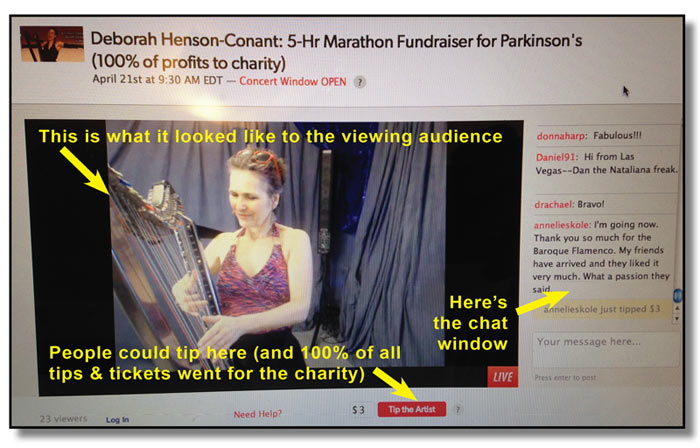
Did you miss it?
My NEXT live Webshow at ConcertWindow is Sun. May 18 – so buy pay-what-you-want tickets now and/or sign up to get a reminder – you can watch from anywhere in the world, and chat with me and the audience — right on your computer.
What did the Harpathon teach me?
When you invest in a challenge, it gives back a rich field for growth. And pain. And change. And learning.
Here are some of the things that I learned from ‘running’ this harp-a-thon:
1. There’s No Rush
I learned something about slowing down. The truth is, I like to play fast sometimes. OK, a lot of the time.
It’s a challenge for me to slow down, but in the middle of a long training session I suddenly thought: “Hey, what’s the hurry? You’ll be playing for five and a half hours. Why are you rushing through the tune?”
Jonathan says you learn the same thing in a marathon: pacing. You know you’re in it for the long haul. That changes everything.
2. Endurance is its own Reward
I first started running in my mid-30s to build endurance on stage. I was playing jazz clubs, and found myself losing energy by the end of the night. I wanted to change that. I wanted to end the night with a feeling of complete strength.
I figured if I could run for 2 hours straight, I could play for 4 hours, so I started building my long-distance running as a way to build stamina. I kept at it ‘til I could do the 2 hours, and that seemed to kick something in for me.
Now I run most days, between 30 – 70 minutes, more as a stress-reducer than an energy builder – but it works for both.
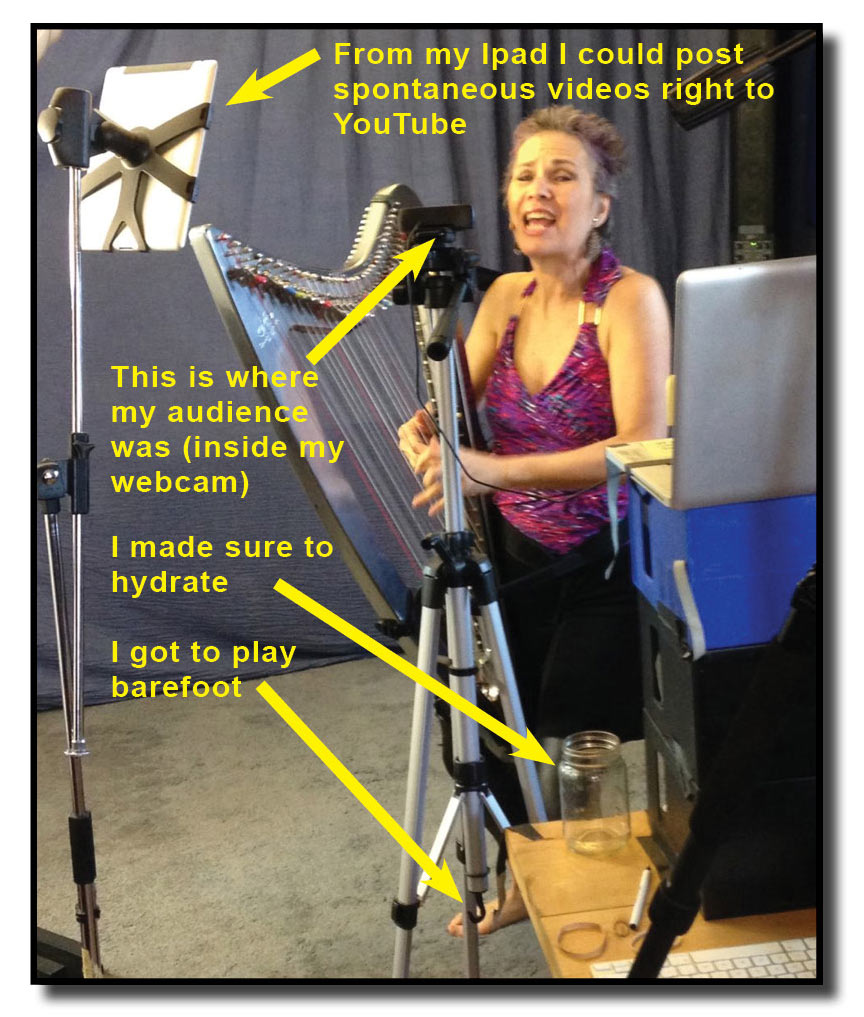
3. Excess Has Value
In fact, I don’t think I was training to excess – but my training seemed excessive because I generally don’t try to perform, or even practice for hours straight every day. And, in fact, it was the practicing – the training that brought me the most in terms of learning. The event itself was just fun – tiring, body-exhausting, but fun.
The value of the excess in training was the time to really invest in what my body was doing, to discover it. And what I found was:
4. My head!
Somehow, in the middle of all this, I discovered my head, and how flexible my neck was, and how fun it was to just move my head around. No, I was not on drugs – unless focus and exhaustion is a kind of drug.
I just know I discovered my head. And suddenly all I wanted to do was throw it around like a ball. It was delicious. Silly. Wonderful. It made me laugh out loud. Like a marvelous discovery – a wonderful new part of the music.
The next day it wasn’t quite so delicious – the ball was more tightly tethered. But it was worth it for the sheer joy of discovering something that was right there. All the time.
Here’s how I found my head: I videotaped myself while I was training, I watched the video and noticed my neck and head seemed very stiff. So I started moving it intentionally. Then I moved it more … and more. It felt great. It started to feel like dancing.
5. Nuts & Bolts Hold Things Together
The first thing I did to prepare for the Harp-a-thon was to go through all my setlists for the last 4-5 years and make a list of all the music I wanted to play. I didn’t want to find myself 2 ½ hours in, worrying about which song I would play next.
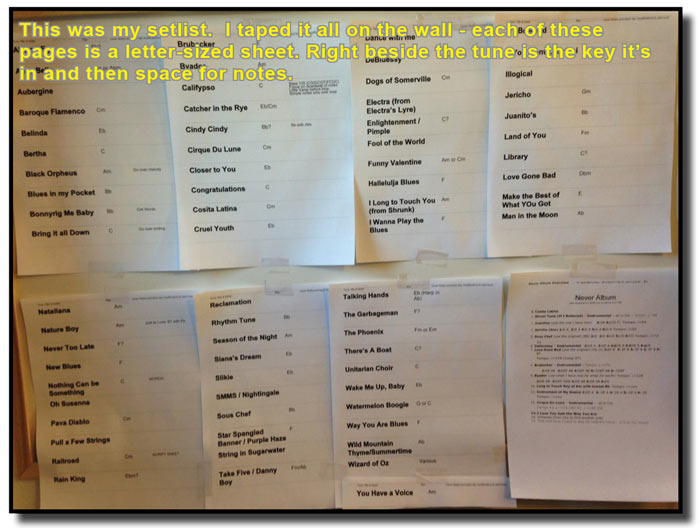
So I printed them all up large (so I could write notes on them) and taped them to the wall, so they were clearly visible. I don’t normally read from sheet music because I’m improvising – so the list on the wall just had the bare-bones information for each piece: the name of the tune, what key it’s in, anything tricky about it, and maybe a few performance notes. More like a cheat-sheet.
And for a couple of tunes, I taped up the words to the songs on the wall.
I had about 75 songs on the list. I think I only got to about 50 because I was improvising a lot and there was one piece, “Baroque Flamenco” that I played 3 times.
6. Training-Time Makes a Big Difference
I logged training hours – or what musicians might call ‘practice’ – in the same way you log hours running. I just put in the hours, and built up, so I wasn’t forcing my body to suddenly perform for five hours.
Since I didn’t have weeks and weeks to train (actually, this whole experience kind of fell together at the last minute), I would sometimes split time, practicing in the morning and again in the evening, just to get the hours in.
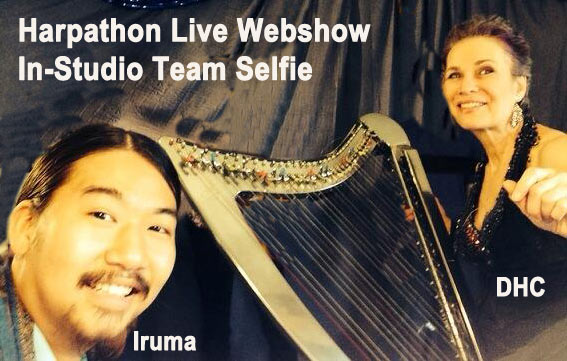
7. The challenge is individual – the TEAM makes it work
It was a great experience, I learned a LOT. But in order for it to succeed as an ‘event,’ I needed a team.
Big idea. Cool idea. Sure. But the idea and the implementation of the idea are two different things. I could put that idea into action only because of ConcertWindow.com, Team Fox (Michael J Fox Foundation), my husband Jonathan (who was running the actual Boston Marathon that day to raise money and was my inspiration for the harp-a-thon), my neighbor Iruma – who stayed with me the whole time, tweeting, posting, videotaping and holding up signs to tell me when people added to the tip jar, or asked questions – and all the wonderful people who came to the show and donated to the cause.
The challenge was mine, but it connected because ConcertWindow.com and Team Fox created the back-end that connected my personal challenge to my husband’s challenge, and because of all the people who came to the concert (some stayed nearly the whole 5.5 hours!), cheered me on and donated and my neighbor helped me keep it all together.
8. Even when we’re helpless to right a wrong, we can do something to connect.
Parkinson’s is a huge wrong. It’s a disease that steals the dignity of its victims, a disease that a beloved family member has. And there’s nothing I can do to make that right.
But this event helped us raise money that just might help to right that wrong someday — and it helped us connect around trying to right that wrong.
My next live Webshow is Sun. May 18 at 4:30 pm. Get tix here. If you’re reading this after that date, you can see when the next live webshow is by going my Artist page on ConcertWindow.com or to DHC-TV.com.
To read more about the Harpathon, how it happened and what it was, read these posts:
- Act of Love – Harpathon for Parkinson’s Research: read it here
- Harping the Boston Marathon for Parkinson’s: read it here
- Marathon Music – Livestream 5.5 Hour Show – Mon. Apr. 21 : read it here
To donate to the “Team Fox” fund for this event link to it here. This is the “Team Fox” page for my husband’s marathon running, so all the money raised in the live webshow was added through this page as well, so it could go direct to research.


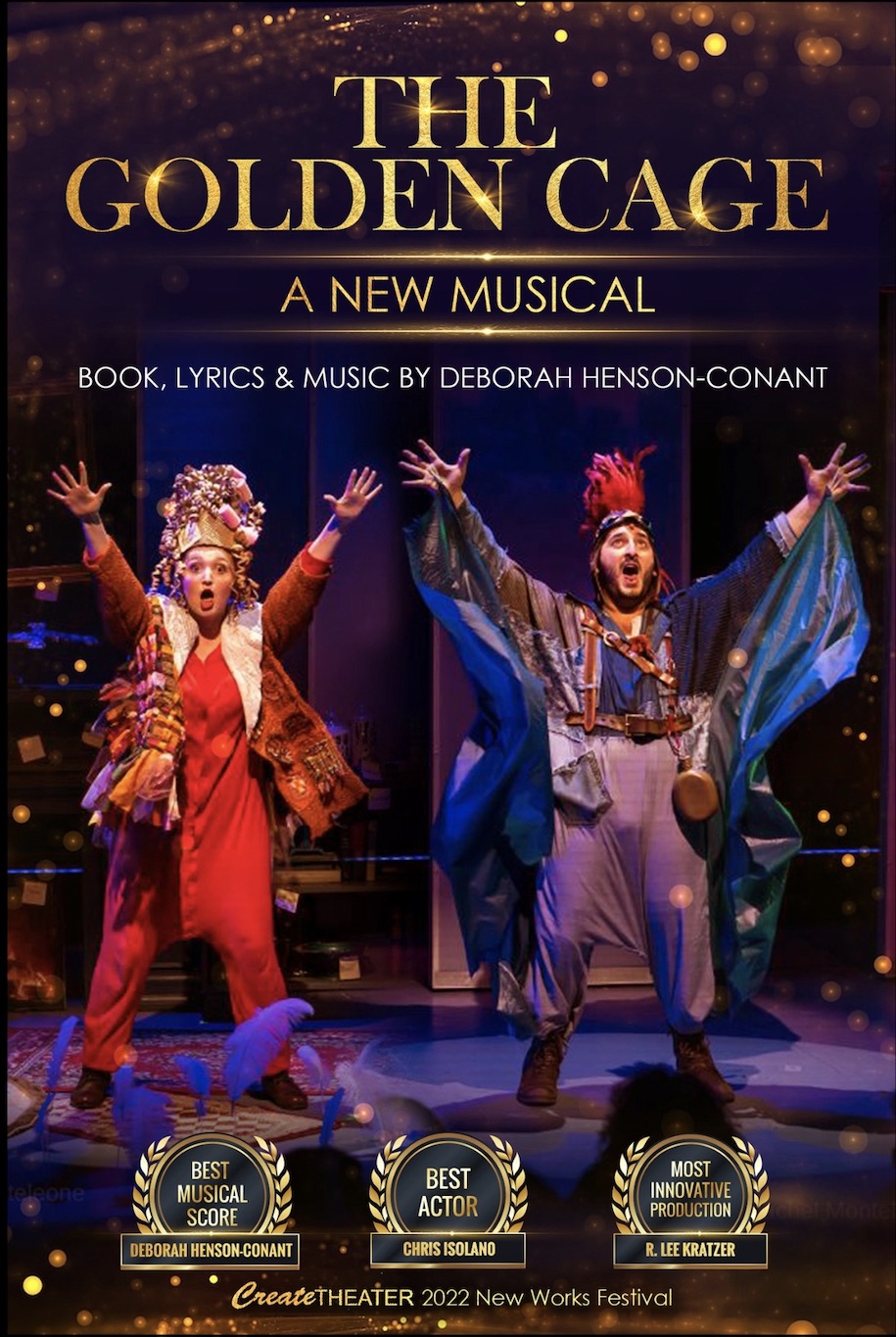
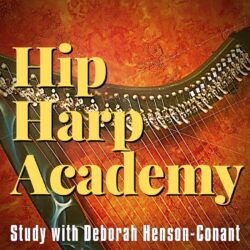
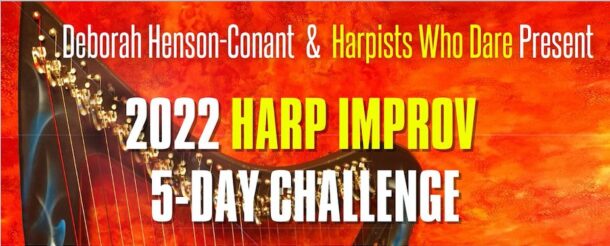
Join for Freebies, Stories & News
Join to get weekly-ish emails with stories, videos & events like concerts & classes
Yay! You should get my next newsletter within the next 7-10 days. I'm so happy we'll be in touch!
I won't ever share your email address with others - and you can unsubscribe anytime, tho most people say they really enjoy these weeklish emails.